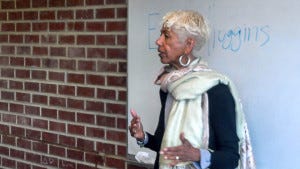In a society still clashing on issues of race, sexuality, Ericka Huggins offers insight on social justice
Armed with a calm demeanor and a kind smile, former Black Panther Ericka Huggins spoke to Laney’s Perspectives on Racism class Oct. 30 to share her wisdom on race, gender roles, and education.
The class, instructed by Alicia Caballero, had recently finished readings in “Want to Start a Revolution?”, a book profiling 16 women and their contributions to progressive social movements from the 1920s to today.
“If you believed the media you would think that only men forwarded social movements,” said Huggins.
Huggins, a contributor to “Want to Start a Revolution?”, offered an interactive discussion with the class in order to share her perspective on the struggle for racial and sexual equality.

To begin the conversation, Huggins spoke with the class on the definition of racism. All agreed that racism was the domination of one race over another.
But Huggins also added to that definition by saying that racial domination was also institutional, and that racism was limited to individual thought without a large-scale systemic application.
The prison system, said Huggins, was one of the major contributors to racism in modern society.
“Otherwise, how could there be 3.5 million people in prison?” said Huggins. “Sixty-nine percent of them are black and brown.”
Though no one in the classroom was responsible for the creation of such a racially biased system, said Huggins, it was every student’s responsibility to both understand that system and resist participation in it.
“We can all fight for the upliftment of everyone,” said Huggins.
Huggins asked the class what they were told by their parents to think of different ethnic groups.
Several students said that they were encouraged by their parents to separate themselves from people of different races.
“It’s bizarre what racism does. It harms hearts…It abuses minds, and most importantly, it confuses children,” said Huggins.
Huggins then told the class about a Haitian friend that told her Haitians were not considered Latino in many parts of Latin America due to their skin color.
Yet Huggins’ friend also confessed to separating themselves from Puerto Ricans and Cubans because they were “low class.”
“There is so much work to do,” said Huggins.
Huggins also discussed the importance of Yuri Kochiyama in bringing attention to the Japanese internment camps of WWII, as well as her own relationship with Malcolm X.
Repeatedly stressed in her speech was Huggins’ belief that the battle against racism is fought by people of all races.
“There is no monopoly on suffering, folks,” she said.
Huggins also spoke of the Oakland Community School, an elementary school program started by the Black Panther party at which Huggins was a teacher.
The Oakland Community School employed alternative teaching techniques that stressed educating young African American and poor students about their history within the United States.
“We were gender neutral and race free,” Huggins said of the school
A former student of Huggins’ laughed when she asked him what his experience with race was at the Oakland Community School.
The school’s educational program had taught their students in such a way that the students were almost unaware of their racial differences.
It wasn’t until attending a public middle school that Huggins’ former student recognized racial distinctions.
“That was the first time he knew that he was white,” said Huggins.
Huggins was the founder of the New Haven Black Panther Party in New Haven, Conn. She is an instructor at California State University East Bay. For more information on Huggins, visit her website at www.erickahuggins.com.

























